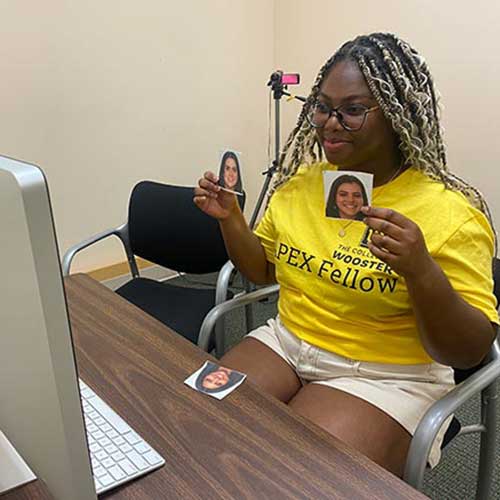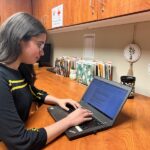
Psychology major conducts qualitative studies on bilingual children during APEX Fellowship

Rachel Yamson ’25, a psychology major and communication sciences and disorders minor, completed an APEX Fellowship at the Language Development Lab at the University of Texas at Austin over the summer. Yamson used the Language Development Lab to research how mono and bilingual children obtain complex language skills and are influenced by demographic qualities. Her internship heavily focused on qualitative testing with children, where Yamson would guide the participants through a series of questions to gain insight into their processing abilities and stereotype characteristic perceptions they hold for foreign and native accented speakers. Through her internship, Yamson gained proper insight into graduate school research and helped narrow her choices with future schooling.
“This internship was a good fit because it offered me the potential to gain experience for I.S. It had a nice location, and they were testing kids, which was helpful as I wanted more experience working with pediatric participants.”
—Rachel Yamson ’25
Q: How did you learn about the internship opportunity for your APEX Fellowship?
Yamson: I searched for psychology labs around the country and found some with ongoing studies that piqued my interest in Language Development. I then sent out cold emails and chatted with a few professors until I found the perfect fit for me. This internship was a good fit because it offered me the potential to gain experience for I.S. It had a nice location, and they were testing kids, which was helpful as I wanted more experience working with pediatric participants.
Q: What interests you most about the work you did?
Yamson: The most interesting part was testing, where I got to talk with the kids directly and walk them through different study trials. I also participated in the recruitment of children and coded data.
Q: Who was your mentor and how did they help you to succeed in this position?
Yamson: I had a different mentor for each project I worked on while at my internship. My mentors included University of Texas at Austin professor and primary investigator for my lab, Catharine Echols, and Ajna Kertesz and Madeleine Garza, both of whom were graduate students at the University of Texas at Austin. They helped me succeed by really taking the time to provide in-depth training on all the tasks I was given and checked in on me frequently. I constantly felt guided throughout my experience.
Q: How has the internship helped you to see what’s next for you?
Yamson: I was able to get a first-hand view of what grad school looks like, helping me narrow down my choices for a graduate degree post-Wooster.
Posted in Experiential Learning, Showcase Stories 2024 on August 10, 2024.
Related Posts
Related Areas of Study
Psychology
Do research, work with faculty mentors, and tailor a psychology program to your interests
Major MinorCommunication Sciences & Disorders
Start the path toward a career in audiology or speech language pathology through coursework and clinical experiences.
Major Minor

